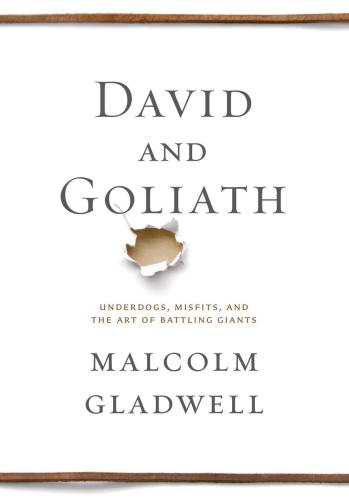
David and Goliath
Underdogs, Misfits, and the Art of Battling Giants
کتاب های مرتبط
- اطلاعات
- نقد و بررسی
- دیدگاه کاربران
نقد و بررسی

Starred review from September 1, 2013
A far- and free-ranging meditation on the age-old struggle between underdogs and top dogs. Beginning with the legendary matchup between the Philistine giant and the scrawny shepherd boy of the title, New Yorker scribe Gladwell (What the Dog Saw: And Other Adventures, 2009, etc.) returns continually to his main theme: that there are unsung advantages to being disadvantaged and overlooked disadvantages to being "advantaged." Though the book begins like a self-help manual--an early chapter on a middle school girl's basketball team that devastated more talented opponents with a gritty, full-court press game seems to suggest a replicable strategy, at least in basketball, and a later one shows how it's almost patently easier to accomplish more by being a big fish in a small pond than a small fish in a big pond--it soon becomes clear that Gladwell is not interested in simple formulas or templates for success. He aims to probe deeply into the nature of underdog-ness and explore why top dogs have long had such trouble with underdogs--in scholastic and athletic competitions, in the struggle for success or renown in all professions, and in insurgencies and counterinsurgencies the world over. Telling the stories of some amazingly accomplished people, including superlawyer David Boies, IKEA founder Ingvar Kamprad, and childhood-leukemia researcher Jay Freireich, Gladwell shows that deficits one wouldn't wish on anyone, like learning disabilities or deprived childhoods, can require a person to adapt to the world in ways that later become supreme benefits in professional life. On the other hand, children of the newly wealthy who have had every good fortune their parents lacked tend to become less well-equipped to deal with life's random but inevitable challenges. In addition to the top-notch writing one expects from a New Yorker regular, Gladwell rewards readers with moving stories, surprising insights and consistently provocative ideas.
COPYRIGHT(2013) Kirkus Reviews, ALL RIGHTS RESERVED.

Starred review from October 1, 2013
Gladwell's best-sellers, such as The Tipping Point (2000) and Outliers (2008), have changed the way we think about sociological changes and the factors that contribute to high levels of success. Here he examines and challenges our concepts of advantage and disadvantage in a way that may seem intuitive to some and surprising to others. Beginning with the classic tale of David and Goliath and moving through history with figures such as Lawrence of Arabia and Martin Luther King Jr., Gladwell shows how, time and again, players labeled underdog use that status to their advantage and prevail through the elements of cunning and surprise. He also shows how certain academic advantages, such as getting into an Ivy League school, have downsides, in that being a big fish in a small pond at a less prestigious school can lead to greater confidence and a better chance of success in later life. Gladwell even promotes the idea of a desirable difficulty, such as dyslexia, a learning disability that causes much frustration for reading students but, at the same time, may force them to develop better listening and creative problem-solving skills. As usual, Gladwell presents his research in a fresh and easy-to-understand context, and he may have coined the catchphrase of the decade, Use what you got. (Reprinted with permission of Booklist, copyright 2013, American Library Association.)

May 15, 2013
The Davids of the earth can triumph, and in explaining how, hugely best-selling author Gladwell doesn't settle for the standard case studies of inspirational literature but digs deep into conflict in Northern Ireland and failing classrooms, for instance, to show that what's truly advantageous isn't always what we think.
Copyright 2013 Library Journal, LLC Used with permission.

November 15, 2013
New Yorker staff writer Gladwell (Tipping Point; What the Dog Saw) argues that what may appear to be the obvious answer to questions may not be so obvious. For instance: Do smaller classroom sizes mean students will have higher grades and test scores? Has California's Three Strikes law lowered crime in that state? He compares the biblical story of David and Goliath (the battle between the underdog and the giant) to events from everyday life that question how people think about disadvantages and obstacles. Through extensive research and interviews, he analyzes the pluses and minuses of classroom size and university selection. He discusses the theory of "desirable difficulty" from the perspective of civil rights leaders, cancer researchers, and dyslexics, as well as the limits of power after losing a loved one to a tragic event. VERDICT A thought-provoking book that makes readers consider what's below the surface and investigate deeper into what goes on in our day-to-day lives and in the world at large. Recommended for anyone who wants to learn how to examine facts in an alternative manner, as well as undergraduate and graduate students, scholars, and researchers studying psychology, sociology, and history.--Tina Chan, SUNY Oswego
Copyright 2013 Library Journal, LLC Used with permission.

























دیدگاه کاربران